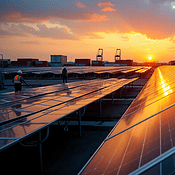
When Is Solar Worth It
Why Go Solar?
In today’s fast-changing energy landscape, the question “when is solar worth it?” has become more relevant than ever. With rising energy costs and increasing environmental concerns, solar power stands out as a promising alternative.
Solar offers a clean, sustainable way for you to generate and use electricity that will help offset your energy usage and ultimately your energy costs. Homeowners often choose solar to gain control over their energy sources, escape rising energy prices, and achieve significant cost-savings over time.
In this guide, we will cover key factors that can help you decide if solar energy is the right choice for you. From assessing your home’s solar potential to analyzing the financial benefits of solar, we aim to provide a comprehensive overview that gives you more insight to determine if solar is worth it for you.
Evaluate Your Energy Usage

To effectively evaluate your energy usage, start by understanding your electric bill. Your energy bill shows how much electricity you use and how much it costs.
- Check the meter reading at the beginning and end of the billing period to see how much electricity you’ve used
- Find the section that shows the total kilowatt-hours (kWh) used during the billing period
- Use the total kWh as a baseline and calculate your annual average by looking at previous billing statements
Once you’ve identified how much energy you typically consume, you have a sense of how much you can save with solar. Moreover, understanding the different rate structures like fixed, time-of-use, and variable rates can help you optimize your solar panel purchase to maximize savings.
Initial Investment Costs Of Solar Panels
Thinking about going solar and curious about the costs? It’s like trying to predict the weather—there are a lot of variables! Let’s shine some light on what really goes into the price of solar panel installation.
The cost of solar panels and installation can vary based on several factors. The size, system equipment, use of solar batteries, labor, permits, and additional fees can contribute to the overall installation cost.
Skilled professionals are essential due to the complexity of the process. Finding someone who is professional and experienced may add to the costs, but it is highly recommended you go with an installer who knows what they are doing.

Rising Energy Costs Make Solar Worthwhile
Rising energy costs are a looming concern for homeowners, potentially draining household budgets. As utility bills skyrocket without warning, as it has done historically in California, families could find themselves in precarious financial situations. Over time, these escalating costs can erode your long-term financial security.
High Electricity Rates and Usage
Energy costs continue to rise and homeowners typically have no control over this. In California, prices are set by the Public Utilities Commission and the individual utility companies. These prices are affected by several factors including changes in technology, government policies, and supply and demand dynamics.
Solar is an alternative energy source that sits in the homeowner’s control. For homeowners who do have solar, energy rates have very little effect on their wallets, as they will be relying mostly on stored solar energy for a majority of the year and the costs are mostly associated with the size and installation of the system.
Potential Savings To Make Solar Worth It
To determine your solar payback period, begin by subtracting any rebates or incentives from the total installation cost of your solar system. For instance, if the system costs $30,000 and you benefit from $9,000 in incentives, your net cost is $21,000. If your annual savings from lower electricity bills amount to $2,800, divide the net cost by these annual savings. This calculation ($21,000/$2,800) reveals a payback period of 7.5 years. The savings generated from your solar system effectively pay back its initial cost, leading to direct financial benefits in subsequent years after the payback period.
Solar Calculators
The annual projected savings is based on your system size, solar panel efficiency, and other factors that a solar consultant can review with you. Based on a site survey, they can estimate your expected solar production, and based on your energy bill, you can calculate your savings.
One way to find out how much solar you could produce is to get a quote from a solar professional and determine the kWh cost and how many kWhs you’ll produce.
Count Us As A Benefit
At Solar Negotiators, we can help you forecast how much annual savings you would obtain from going solar. We use a proprietary tool called Know True-Up® which computes thousands of data points from your previous energy bill statements to estimate your savings. Reach out to one of our team members and we can walk you through the process!
Additional Considerations
Solar Batteries Store Energy From The Sun
Solar batteries offer cost-saving efficiencies by allowing homeowners to store solar energy from the sun during low-cost periods and use stored energy during peak times, thereby reducing overall energy expenses. This makes solar batteries worthwhile as electricity prices have increased a lot year over year! Additionally, solar battery backup systems can provide a reliable power supply during outages, enhancing your home’s energy independence and reliability.
Available Incentives and Rebates For Panel Installation
Additionally, federal, state, and local incentives and rebates can significantly reduce the initial investment in solar, making solar more affordable. The federal tax credit allows a 30% rebate on the total installation costs in many situations, with no cap.
These rebates and credits enhance the return on investment, making solar a great financial decision in the long run.
Home Resale Value
Installing solar panels typically increases the overall value of your home, with some studies indicating an increase of around 4.1%. This rise in property value is due to the energy savings that solar power offers, making your home more appealing to potential buyers.
Additionally, homes with solar installations often sell faster, enhancing the long-term investment benefits of going solar.
Conclusion
By looking at how much energy you use, how much solar can save you, and how much a solar system could cost, it’s clear that solar power is a great investment choice. Solar power can save you money over time, battle against inflation and rising energy costs, and allow you to rely less on third-party energy sources. Also, special offers and discounts make investing in solar power more cost-effective, giving you an alternative way to be more independent as a homeowner.
If you’re ready to learn more about solar power, please contact one of our solar experts. They will help you understand everything about solar power as an investment and alternative energy source.
Recent Posts
Solar Tariffs – Are They Here To Stay?
Solar Backup Solutions: How Do Solar Batteries Work?
When Is Solar Worth It
Reduce your reliance on the energy grid.
Get Solar In
Your Inbox

Refer friends and get paid in-app
The more referrals you bring in, the higher your earnings.
Earn $1,000 for each referral, and bonuses of up to $1,500 once you hit your 10th referral.





